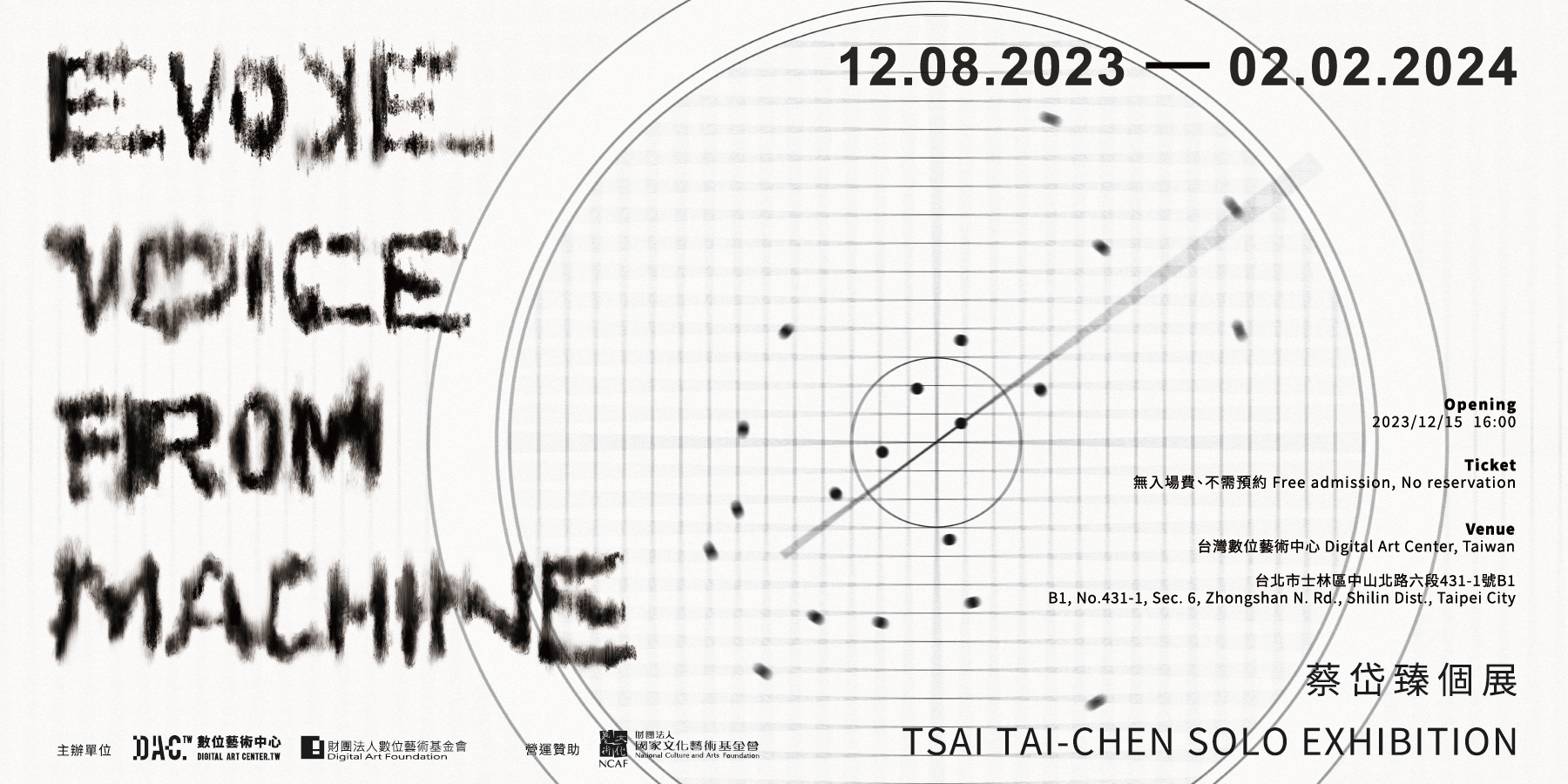➤展期 Duration:2023/12/08– 2024/02/02
➤開幕 Opening:2023/12/15 16:00
➤地點 Venue:台灣數位藝術中心 Digital Art Center, Taiwan
➤地址 Address:111 台北市士林區中山北路六段431-1號B1
B1, No.431-1, Sec. 6, Zhongshan N. Rd., Shilin Dist., Taipei City
➤預約 Ticket:Free admission, No reservation 無入場費、不需預約
➤開幕 Opening:2023/12/15 16:00
➤地點 Venue:台灣數位藝術中心 Digital Art Center, Taiwan
➤地址 Address:111 台北市士林區中山北路六段431-1號B1
B1, No.431-1, Sec. 6, Zhongshan N. Rd., Shilin Dist., Taipei City
➤預約 Ticket:Free admission, No reservation 無入場費、不需預約
◙ 展覽介紹 ◙
在日常情境中,機器的語言被人類預設必須含有客觀的質性,僅能使用特定中性的文字、語氣進行描述及回應,因此機器的語言長期以來僅在侷限的範疇中轉譯及生成,避免表述帶有主觀傾斜的同時,其語言也顯露出蒼白缺乏情感的樣貌。本計畫使用心理學喚醒情感狀態的影像資料集,作為影響機器情感狀態的外部刺激,並參照人類主觀表述的句型,置換機器固著的中性描述,探勘機器表述及發聲的可能性。
在日常情境中,機器的語言被人類預設必須含有客觀的質性,僅能使用特定中性的文字、語氣進行描述及回應,因此機器的語言長期以來僅在侷限的範疇中轉譯及生成,避免表述帶有主觀傾斜的同時,其語言也顯露出蒼白缺乏情感的樣貌。本計畫使用心理學喚醒情感狀態的影像資料集,作為影響機器情感狀態的外部刺激,並參照人類主觀表述的句型,置換機器固著的中性描述,探勘機器表述及發聲的可能性。
◙ Exhibition Introduction ◙
In real-life settings, machine language is pre-programmed to be objective and can only address topics and respond with neutral vocabulary and phrases. Therefore, machine language has long been translated and generated under a very limited setting. As such a setting avoids subjective and biased expressions, the language generated also appears unexpressive and shows a lack of emotions. This project, based on psychological theories, adopts image data sets that trigger emotions as external stimuli that activate emotional models of machines. Sentence patterns that humans use in subjective expressions are selected to replace the neutral expressions programmed in machines. With these conditions, this project attempts to explore the possibility of machine development in terms of subjective opinions and emotion expressions.
In real-life settings, machine language is pre-programmed to be objective and can only address topics and respond with neutral vocabulary and phrases. Therefore, machine language has long been translated and generated under a very limited setting. As such a setting avoids subjective and biased expressions, the language generated also appears unexpressive and shows a lack of emotions. This project, based on psychological theories, adopts image data sets that trigger emotions as external stimuli that activate emotional models of machines. Sentence patterns that humans use in subjective expressions are selected to replace the neutral expressions programmed in machines. With these conditions, this project attempts to explore the possibility of machine development in terms of subjective opinions and emotion expressions.
◙ 關於藝術家 ◙
目前為國立清華大學資訊系統與應用研究所博士生,同時擔任國立清華大學藝術學院學士班兼任講師。作品及研究聚焦於人機互動、虛擬實境與人工智慧,透過人類與機器相互為鏡的方法,鬆動其各自的既定定義,探索人類與機器互動關係的可能性。曾獲 KT科技藝術金獎及技術創新獎(2017)。作品及研究曾發表於 ACM MM ( 2022 )、IEEE AIVR ( 2021 ) 、雅典數位藝術節(2019)、台北白晝之夜(2017)與關渡光藝術節(2016)等國內外展覽及研討會。
目前為國立清華大學資訊系統與應用研究所博士生,同時擔任國立清華大學藝術學院學士班兼任講師。作品及研究聚焦於人機互動、虛擬實境與人工智慧,透過人類與機器相互為鏡的方法,鬆動其各自的既定定義,探索人類與機器互動關係的可能性。曾獲 KT科技藝術金獎及技術創新獎(2017)。作品及研究曾發表於 ACM MM ( 2022 )、IEEE AIVR ( 2021 ) 、雅典數位藝術節(2019)、台北白晝之夜(2017)與關渡光藝術節(2016)等國內外展覽及研討會。
◙ About the Artist ◙
A current PhD student at the Institute of Information Systems and Applications, National Tsing Hua University (NTHU), Tsai Tai-Chen also serves as an adjunct lecturer at the bachelor’s program at College of Arts at NTHU. Tsai’s works and research focus on human-machine interaction, virtual reality (VR), artificial intelligence (AI). By using humans and machines as subjects for the both to learn from each other, the definitions of the two can be broadened, which, in turn, could facilitate researching interactions between humans and machines. Tsai received the Gold Award and Technology Create Award from K. T. Creativity Award (2017). and her works and research have been displayed and published at exhibitions and seminars, both at home and abroad, including ACM Multimedia (2022), IEEE AIVR (2021), Athens Digital Arts Festival (2019), Nuit Blanche | Taipei (2017), and KuanDu Light Art Festival (2016).
A current PhD student at the Institute of Information Systems and Applications, National Tsing Hua University (NTHU), Tsai Tai-Chen also serves as an adjunct lecturer at the bachelor’s program at College of Arts at NTHU. Tsai’s works and research focus on human-machine interaction, virtual reality (VR), artificial intelligence (AI). By using humans and machines as subjects for the both to learn from each other, the definitions of the two can be broadened, which, in turn, could facilitate researching interactions between humans and machines. Tsai received the Gold Award and Technology Create Award from K. T. Creativity Award (2017). and her works and research have been displayed and published at exhibitions and seminars, both at home and abroad, including ACM Multimedia (2022), IEEE AIVR (2021), Athens Digital Arts Festival (2019), Nuit Blanche | Taipei (2017), and KuanDu Light Art Festival (2016).
 EXHIBITION
EXHIBITION
